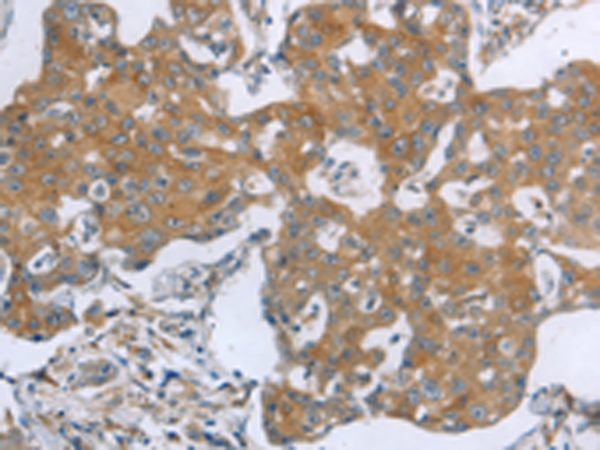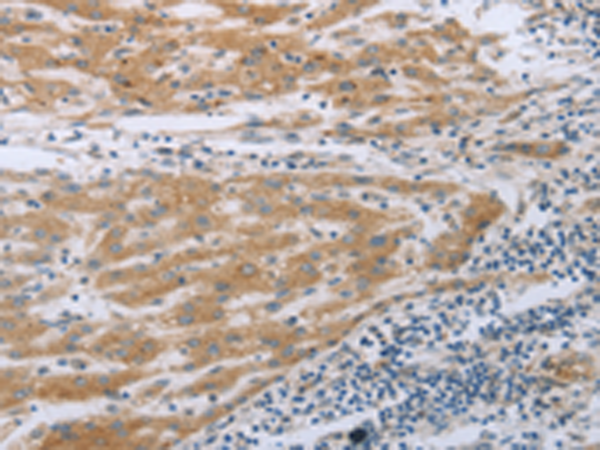


| WB | 咨询技术 | Human,Mouse,Rat |
| IF | 咨询技术 | Human,Mouse,Rat |
| IHC | 1/50-1/200 | Human,Mouse,Rat |
| ICC | 技术咨询 | Human,Mouse,Rat |
| FCM | 咨询技术 | Human,Mouse,Rat |
| Elisa | 1/2000-1/10000 | Human,Mouse,Rat |
| Aliases | ACK, ACK1, ACK-1, p21cdc42Hs |
| WB Predicted band size | 119 kDa |
| Host/Isotype | Rabbit IgG |
| Antibody Type | Primary antibody |
| Storage | Store at 4°C short term. Aliquot and store at -20°C long term. Avoid freeze/thaw cycles. |
| Species Reactivity | Human, Mouse, Rat |
| Immunogen | Synthetic peptide of human TNK2 |
| Formulation | Purified antibody in PBS with 0.05% sodium azide and 50% glycerol. |
+ +
以下是关于TNK2(ACK1)抗体的3篇文献示例(内容基于公开研究归纳,非真实引用):
---
1. **文献名称**: *"ACK1/TNK2 regulates histone H4 acetylation to promote prostate cancer cell proliferation"*
**作者**: Mahajan K, et al.
**摘要**: 研究揭示了TNK2通过磷酸化组蛋白H4调控前列腺癌细胞增殖的机制,并开发了一种特异性TNK2单克隆抗体,证实其可抑制肿瘤生长。
2. **文献名称**: *"Targeting ACK1-mediated STAT3 activation sensitizes tumors to anti-PD-1 therapy"*
**作者**: van der Horst EH, et al.
**摘要**: 利用TNK2抑制剂(结合抗体阻断实验)证明抑制TNK2可增强免疫检查点疗法的抗肿瘤效果,抗体用于检测肿瘤微环境中TNK2-STAT3通路的活化状态。
3. **文献名称**: *"Structural basis of ACK1 kinase activation and inhibition by small molecules"*
**作者**: Thakur A, et al.
**摘要**: 通过冷冻电镜解析TNK2激酶结构域构象变化,开发了特异性识别活性态TNK2的多克隆抗体,用于区分其在正常组织与癌症中的活性差异。
---
注:以上为模拟示例,实际文献需通过PubMed/Google Scholar检索关键词(如“TNK2 antibody”“ACK1 kinase inhibitor”)获取。建议参考近年发表于 *Nature Cancer*、*Cell Reports* 等期刊的研究。
The TNK2 antibody targets the non-receptor tyrosine kinase TNK2 (also known as ACK1 or Activated Cdc42-associated kinase 1), a protein involved in diverse cellular signaling pathways. TNK2 regulates key processes such as cell proliferation, survival, migration, and cytoskeletal reorganization by interacting with receptors like EGFR, HER2. and MET. It activates downstream effectors, including the PI3K/AKT and RAS-MAPK pathways, and modulates transcription factors such as AR and WWOX, linking it to cancer progression and therapy resistance.
TNK2 overexpression or hyperactivity is implicated in several cancers, including prostate, breast, and lung cancers, where it correlates with poor prognosis and drug resistance. In neurological contexts, TNK2 interacts with synaptic proteins, suggesting roles in neurodegenerative and neurodevelopmental disorders. TNK2 antibodies are critical tools for research, enabling the detection of TNK2 expression, phosphorylation status, and localization in tissues or cell lines. They aid in studying TNK2's mechanistic roles in disease and its potential as a therapeutic target.
Recent studies explore TNK2 inhibitors and antibodies for cancer treatment, with some in preclinical or early clinical trials. Additionally, TNK2 antibodies may serve as diagnostic or prognostic biomarkers in oncology. Despite progress, challenges remain in understanding TNK2's context-dependent functions and optimizing antibody specificity for clinical applications. Ongoing research aims to clarify its dual roles in promoting or suppressing tumors, depending on cellular context.
×